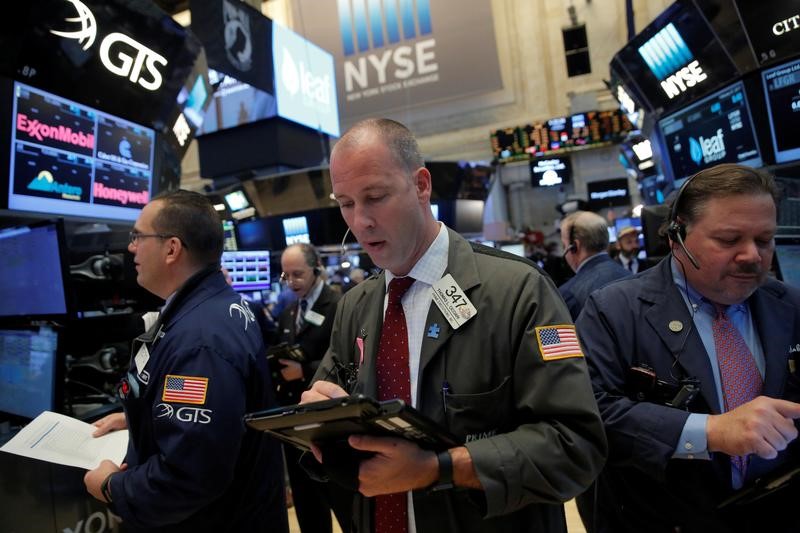By Claire Milhench
LONDON (Reuters) - Global investors trimmed their equities exposure in February, with many arguing that markets had become too complacent about risks stemming from Europe's election calendar after a recent blistering stock market rally.
A Reuters monthly asset allocation poll of 48 fund managers and chief investment officers in Europe, the United States, Britain and Japan showed overall equity exposure in global balanced portfolios had been cut a fraction, to 45.5 percent of portfolios from 45.8 percent in January.
The share of bonds rose to 40.3 percent from 39.9 percent in January, the poll showed.
While the majority of participants expressed concerns about upcoming elections in Europe, especially in France, there was also a view that the reflation trade - a bet on economic growth and inflation - had run ahead of itself.
Investors have piled into equities since Donald Trump's election as U.S. president, betting that his pledges to cut taxes and boost spending will spur growth.
"We think that the reflation trade is widely discounted and that markets have become complacent to downside risks," said Joost van Leenders, chief economist for multi-asset solutions at BNP Paribas (PA:BNPP) Investment Partners.
The poll was conducted between Feb. 13-27, a time when global stocks hit record highs (MIWD00000PUS) and the market cap of the U.S. S&P 500 (SPX) index surged past the $20 trillion mark for the first time.
However, Trump has given few details on how his programmes will be implemented, prompting investors to marginally trim U.S. exposure to 41.2 percent of equity portfolios.
"We simply don't know what Trump will do; his behaviour is erratic and his recent executive orders have had poor implementation," said Peter van der Welle, a strategist at Robeco. "Tax reforms are announced but market patience is being tested in this respect."
Unease is also growing about French presidential elections due in April and May, with far-right candidate Marine Le Pen seen winning 26 percent of the vote in the first round.
Although she is expected to lose in the second round, the possibility of an upset cannot be discounted. Such an outcome could pave the way for a referendum on France's membership of the European Union (EU).
CAUTIOUS ON EUROPE
None of the poll participants who answered a special question on the subject said they were positioning for an EU break-up in the near-term, but several acknowledged this was a future possibility.
European investors have cut euro zone equity holdings to two-year lows, and some, such as Pioneer Investments, said they were hedging risks through options strategies or holding gold, which should outperform when volatility spikes.
"Uncertainty could generate short-term volatility – so our approach to European equities is more cautious even if we see positive fundamentals for the asset class," said Pioneer's global head of multi-asset investments Matteo Germano.
Boris Willems, a strategist at UBS Asset Management, was one of the few to remain relatively upbeat about European assets. He argued economic recovery was gaining momentum, thanks to European Central Bank policies and a weak euro.
"While geopolitical risks are clearly high ahead of major elections in a number of core euro zone countries, we see these risks as well flagged and to a degree, already reflected in valuations," Willems said.
European equities (FTEU3) touched 14-month highs in February and are set to end the month up around 2.4 percent. Despite the misgivings, euro zone equities rose to 17 percent of global investors' equity portfolios, versus 16.7 percent in January.
Poll participants also continued to favour euro zone bonds, raising these to 28.4 percent of their global bond portfolios, the highest level since January 2016, and up from 27.9 percent.
But investors cut UK bonds by 2.5 percentage points to 9.6 percent, the lowest level since September 2016. UK inflation gauges rose in February, with the Confederation of British Industry noting a record increase in its measure of retailer selling-price expectations.
CURRENCY MANIPULATOR?
Another risk is the possibility that the Trump adminstration will label China, Germany or another large trading partner as a currency manipulator, implying that they keep exchange rates artificially low to gain a trade advantage.
Such a formal declaration would require the U.S. Treasury to seek negotiations to resolve the situation, a process that could end in punitive tariffs on the offender's goods.
However, despite Trump calling the Chinese "grand champions" at currency manipulation, investors questioned whether any country met all three official criteria.
To be branded a currency manipulator, a country has to have a significant bilateral trade surplus with the United States, a current account surplus above 3 percent of GDP, and to make persistent foreign currency interventions.
Analysts noted that rather than falsely suppressing the value of the renminbi, Beijing has been actively supporting it to maintain financial stability.

"China only ticks one of the boxes," said Robeco's van der Welle, who believed Germany runs a larger risk of being named.